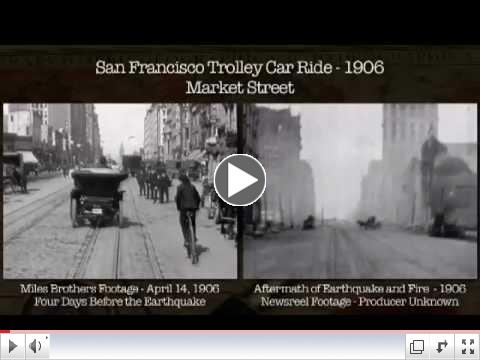Three factors that influence trust
|
The Internet is the gateway to an almost infinite amount of information. Unfortunately, a lot of it is just false, misleading, distorted or just plain bad. We readily acknowledge this and accept it as part of the trade off for having a completely open system. We also comfort ourselves with the thought that the Internet is somehow self -correcting and that eventually the truth will emerge.
If you truly believe this, I will be happy to sell you part of my interest in the Golden Gate Bridge.
While there is a certain amount of truth to the self-corrective nature of the Internet, the fact is that the decision of what to believe is made by people and human nature isn't always rational. I am constantly amazed at the willingness of otherwise intelligent people to believe the most outlandish half-truths or falsehoods from cyberspace.
| |
CLICK HERE TO READ THE REST OF THIS ARTICLE
_________________________________
|
|
San Francisco Earthquake and Fires 1906
 | | San Francisco Earthquake 1906 - Before and After Journey Down Market Street |
This month marks the 106th anniversary of the San Francisco earthquake and fires. This fascinating video shows a side-by-side comparison of footage shot 4 days before the temblor and footage taken shortly after the event.
|
|
Quick Links
 | | My Website |
My Blog
 | | Newsletter Archive |
|
|
Greetings!
Welcome to the April issue of Emergency Management Solutions. Ever wonder why people believe rumors but not warnings? My article this month identifies three factors that may explain why. My monthly newsletter is a great way to keep in touch but you're not getting full value if you're not also signed up for my blog. I usually try to blog twice a week, so don't miss out! You can sign up on my blog site Canton on Emergency Management. 
If you are having trouble viewing my featured article, try clicking on the link at the top of the page. Alternatively, you can always find my white paper on my blog site, Canton on Emergency Management. |
|
Regards,
 |
Professional Development It's always tough to get funding for training. Fortunately, the proliferation of webinars offers a great way to stretch your training budget and still get quality information. One of the best sites for emergency management training is EMForum run by my friend and colleague Avagene Moore. Each month EMForum hosts a presentation on a current topic by a recognized expert. This month's session was Women Building Disaster Resilience: New Resources and Strategies and featured Dr. Elain Enarson, an expert on gender and community resilience. The presentations are archived in a variety of formats and audio podcasts are available through the Itunes store. The best part is the price - it's free, including the Itunes podcast. |
|
Life Balance
When things go wrong, whom do you blame? In many ways, we've fostered a culture where it's always someone else's fault. For example, I just read where the owners of the Cosco Busan, the ship that struck the San Francisco Bay Bridge in 2007 and spilled 53,000 gallons of oil into the Bay, are suing the pharmacists that provided the prescriptions drugs that their captain was taking at the time of the accident. It's always easy to blame someone else or the system; it's not so easy to admit you screwed up. At the same time, you can't dwell on failure. Part of being a professional is understanding the need for continuous improvement. This means accepting responsibility for your mistakes, learning from them, and getting on with your life. |
|
From the Bookshelf
One of the books I always recommend to emergency managers is Claire Rubin's Emergency Management: The American Experience 1900 - 2005. The book provides a context for our current emergency management system and was awarded the 2008 Book Prize by the American Society for Public Administration. I'm happy to report that the second edition is now out and the book now covers the period 1900-2010. Of particular interest are new chapters on the BP oil spill and the evolution of the Federal government's role in emergency management. This is one of those books that should be in every emergency manager's professional library.
|
|
Looking for a Speaker?
Need a speaker for your next conference? I offer keynotes, seminars and workshops. You can find more details on my website or on my SpeakerMix page.
 | | Lucien Canton Seminar Excerpts |
|
|
If you've heard me speak...
...I'd greatly appreciate it if you would take a minute to give me feedback on SpeakerMix. Just go to the site and click on the "Write A Review" button. Many thanks! |
|
|